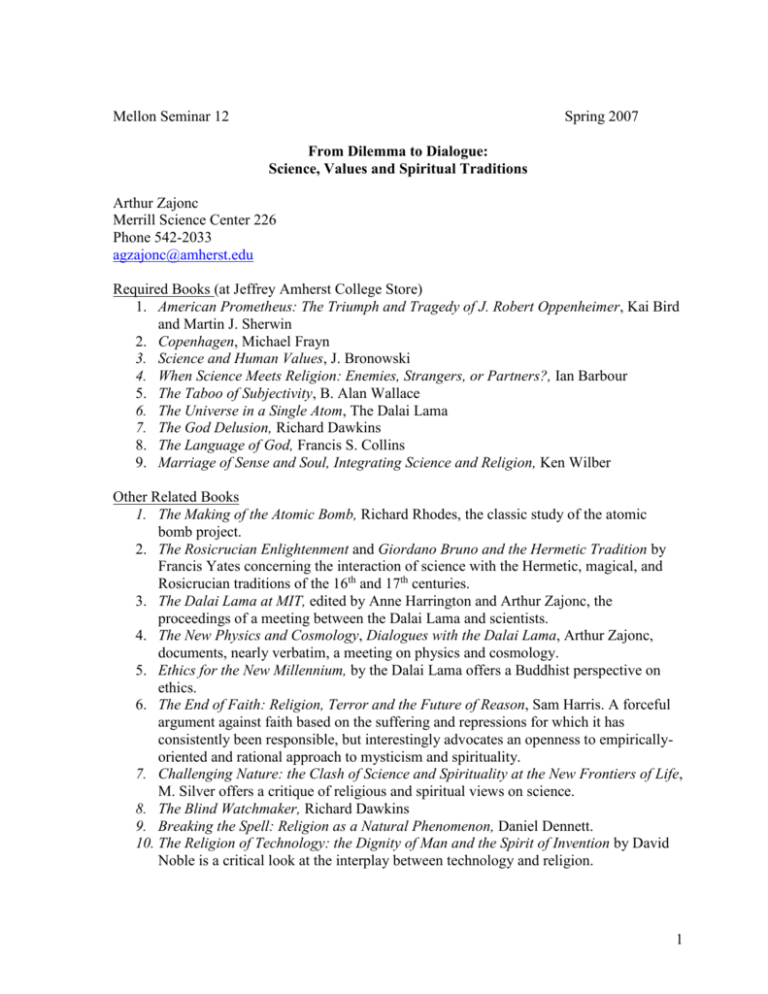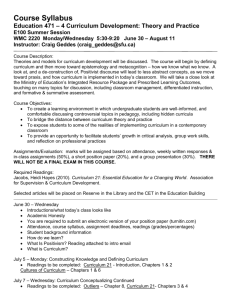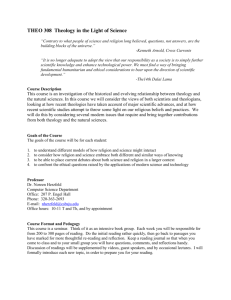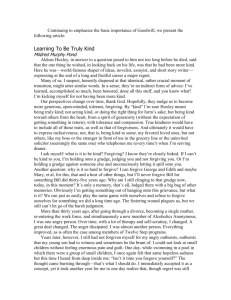Draft syllabus - Arthur Zajonc
advertisement

Mellon Seminar 12 Spring 2007 From Dilemma to Dialogue: Science, Values and Spiritual Traditions Arthur Zajonc Merrill Science Center 226 Phone 542-2033 agzajonc@amherst.edu Required Books (at Jeffrey Amherst College Store) 1. American Prometheus: The Triumph and Tragedy of J. Robert Oppenheimer, Kai Bird and Martin J. Sherwin 2. Copenhagen, Michael Frayn 3. Science and Human Values, J. Bronowski 4. When Science Meets Religion: Enemies, Strangers, or Partners?, Ian Barbour 5. The Taboo of Subjectivity, B. Alan Wallace 6. The Universe in a Single Atom, The Dalai Lama 7. The God Delusion, Richard Dawkins 8. The Language of God, Francis S. Collins 9. Marriage of Sense and Soul, Integrating Science and Religion, Ken Wilber Other Related Books 1. The Making of the Atomic Bomb, Richard Rhodes, the classic study of the atomic bomb project. 2. The Rosicrucian Enlightenment and Giordano Bruno and the Hermetic Tradition by Francis Yates concerning the interaction of science with the Hermetic, magical, and Rosicrucian traditions of the 16th and 17th centuries. 3. The Dalai Lama at MIT, edited by Anne Harrington and Arthur Zajonc, the proceedings of a meeting between the Dalai Lama and scientists. 4. The New Physics and Cosmology, Dialogues with the Dalai Lama, Arthur Zajonc, documents, nearly verbatim, a meeting on physics and cosmology. 5. Ethics for the New Millennium, by the Dalai Lama offers a Buddhist perspective on ethics. 6. The End of Faith: Religion, Terror and the Future of Reason, Sam Harris. A forceful argument against faith based on the suffering and repressions for which it has consistently been responsible, but interestingly advocates an openness to empiricallyoriented and rational approach to mysticism and spirituality. 7. Challenging Nature: the Clash of Science and Spirituality at the New Frontiers of Life, M. Silver offers a critique of religious and spiritual views on science. 8. The Blind Watchmaker, Richard Dawkins 9. Breaking the Spell: Religion as a Natural Phenomenon, Daniel Dennett. 10. The Religion of Technology: the Dignity of Man and the Spirit of Invention by David Noble is a critical look at the interplay between technology and religion. 1 11. The Forge and the Crucible: the Origins and Structure of Alchemy by Mircea Eliade is a classic study of the spiritual dimensions of blacksmithing and alchemy. Online Reader 1. “God vs. Science”, Time, Nov. 13, 2006, pp. 48-55. 2. “A Free-for-All on Science and Religion, George Johnson, N.Y. Times Nov. 21, 2006. 3. “Is There Room for the Soul,” special report by Jay Tolson, U.S. News & World Report, Oct. 23, 2006, pp. 56-63. 4. “The God Experiments,” by John Horgan, Discover Magazine, Dec. 2006, pp. 52-57. 5. “Feynman’s Unanswered Question,” Philosophy & Public Policy Quarterly, Vols. 25 & 26 (2006), Herman Daly article and response by Stephen J. Sullivan. 6. Faith and Knowledge by Douglas Sloan, Chapter 4 “The Theologians and the TwoRealm Theory of Truth” 7. Excerpt from The Rock of Ages by Stephen J. Gould, 3-16; 49-67. 8. “Back from Chaos,” Atlantic Monthly, March 1998, which is an excerpt from Consilience: The Unity of Nature, by Edward O. Wilson 9. The End of Faith: Religion, Terror and the Future of Reason, Sam Harris, Chapters 1, 6, 7. 10. The New Physics and Cosmology: Dialogues with the Dalai Lama, Arthur Zajonc, pp. 3-49. 11. Mere Christianity, C. S. Lewis, pp. 3-32. 12. Man and Nature in the Renaissance, Allen G. Debus, Chapters 1, 2, 8 13. “Finding the Common Ground: The Cognitive Sources of Science and Religion” by Arthur Zajonc 14. William James selection 15. Brooke’s Science and Religion, pp. 317-20 on William James. 16. “Perceiving God,” William P. Alston Journal of Philosophy, vol. 83, (1986) 17. “Rudolf Steiner and Anthroposophy” by Robert McDermott from Modern Esotericism eds. Andre Fauvre and Jacob Needleman 18. “William James and Rudolf Steiner,” by Robert McDermott 19. Selections from Rudolf Steiner, Theosophy 20. “Buddhism and science: on the nature of the dialogue,” José Ignacio Cabezón from Buddhism and Science: Breaking New Ground by B. Alan Wallace 21. “Science as an ally or a rival philosophy? Tibetan Buddhist thinkers’ engagement with modern science” Thupten Jinpa, from Buddhism and Science: Breaking New Ground by B. Alan Wallace 22. “Views of Technology,” Chapter 1 of Ethics in an Age of Technology by Ian Barbour 23. “Human Values,” Chapter 2 of Ethics in an Age of Technology by Ian Barbour. 24. “Buddhist Technology: Bringing a New Consciousness to Our Technological Future” by Arthur Zajonc Week 1: Jan 29/31, Our Dilemma: The Popular Science – Religion Debate Today Monday - Readings: “God vs. Science”, Time, Nov. 13, 2006, pp. 48-55. 2 “A Free-for-All on Science and Religion, George Johnson, N.Y. Times Nov. 21, 2006. “Is There Room for the Soul,” Special Report by Jay Tolson, U.S. News & World Report, Oct. 23, 2006, pp. 56-63. “Feynman’s Unanswered Question,” by Herman Daly in Philosophy & Public Policy Quarterly pp. 13-17. Wednesday -- Readings: Sam Harris, End of Faith, Chapter 1 New Testament, John 20: 19-31. Wilber, Marriage of Sense and Soul, Chapter 1 & 2 (&3 optional). PART 3: The Religion and Science Dilemma Week 2: Feb 5/7, Ways of Relating Science and Religion Monday-- Readings: Ian Barbour, When Science Meets Religion, Chapter 1 Alfred North Whitehead, “Religion and Science” Atlantic Monthly, August 1925. Excerpt from Rock of Ages by Stephen J. Gould, pp. 3-16; 49-67 Wilber, Marriage of Sense and Soul, Chapter 4, 5. Wednesday – Reading: Barbour, Chapter 2 E. O Wilson, “Back from Chaos,” Atlantic Monthly, 1998 Week 3: Feb 12/14, From Quantum to Organism Monday – Reading: Barbour, Chapter 3, The Quantum Excerpt from Zajonc, The New Physics and Cosmology: Dialogues with the Dalai Lama, pp. 3-49. Wednesday – Reading: Barbour, Chapter 4, Evolution Francis Collins, Language of God, pp. 1-54 and pp. 159-234. C. S. Lewis, Mere Christianity, pp. 3-32. Week 4: Feb 19/21, God and Nature Monday – Reading: Barbour: Chapter 5, Genetic, Neuroscience and Human Nature Richard Dawkins, The God Delusion, pp. 1-74 “The God Experiments,” Discover Magazine, Dec 2006. Wednesday – Reading: Barbour: Chapter 6, God and Nature Dawkins, God Delusion, pp. 111-208 Week 5: Feb 26/28, Buddhism’s Take on Quantum, Cosmos, Evolution, and Consciousness Monday -- Reading: The Universe in a Single Atom, Dalai Lama in its entirety. Wednesday-- Reading: “Buddhism and science: on the nature of the dialogue,” José Ignacio Cabezón, “Science as an ally or a rival philosophy? Tibetan Buddhist thinkers’ engagement with modern science” Thupten Jinpa. Selections from The Dalai Lama at MIT, edited by Anne Harrington and Arthur Zajonc 3 PART 2 Cognitively-Oriented Spirituality Week 6: March 5/7, Science as Natural Philosophy and the Hermetic Tradition Monday – Readings: Man and Nature in the Renaissance, Allen Debus, chapters 1, 2, 8 Swedenborg, selections Pierre Hadot, “Philosophy as a Way of Life,” pp. 264-276. Wednesday – Reading: Wilber, Marriage of Sense…, Chapters 6-9 Emerson excerpts from “Nature,” “The Poet,” and Emerson’s quotations concerning science. Goethe Week 7: March 12/14, Empiricism of the Spirit Monday – Reading: William James, selections Wednesday – Reading: Alston, “Perceiving God” Harris, End of Faith, Chapter 7 SPRING BREAK Week 8: March 26/28, Rudolf Steiner’s Anthroposophy Monday – Readings: “Rudolf Steiner and Anthroposophy” by Robert McDermott from Modern Esotericism eds. Andre Fauvre and Jacob Needleman Selections from Rudolf Steiner’s Theosophy, Prefaces, Introduction and Chapter 1 Wednesday – Reading: “William James and Rudolf Steiner,” by Robert McDermott Owen Barfield, “On the Consciousness Soul” from Romanticism Comes of Age. Week 9: April 2/4, The Contemplative Alternative Reading – Monday: Wilber, Marriage of Sense…, Chapters 10-15. Reading – Wednesday: The Taboo of Subjectivity, B. Alan Wallace, pp. 1-120. PART 1: The Ethical Dilemma Week 10: April 9/11 Oppenheimer’s Dilemma: The Manhattan Project [I will be away the whole week working with scientists and the Dalai Lama in India] Readings and media for the week: American Prometheus, Kai Bird and Martin Sherwin, pp. 268-335 (and more if you like) Science and Human Values, J. Bronowski, Chapters 1-3. Audio recording of J. Robert Oppenheimer “On Atomic Energy, Problems to Civilization,” Nov. 6, 1946. Listen to 10 minutes of this, at least, to get a sense for Oppenheimer’s way of thinking and speaking. http://www.lib.berkeley.edu/MRC/audiofiles.html#oppenheimer The Day after Trinity film 4 [Hiroshima Nagasaki (16 minute video)] http://alsos.wlu.edu/default.aspx library on nuclear issues. Showing of the film version of Copenhagen Week 11: April 16/18, Heisenberg’s Dilemma: The German Bomb Project Monday -- Readings: Copenhagen by Michael Frayn Letters of Niels Bohr Heisenberg, Bohr, Einstein on the bomb Wednesday -- Readings: The Goettingen Conversations (Barth’s Neo-orthodoxy) and Stephen Jay Gould’s NOMA Week 12: April 23/25, Views of Technology & Biotech Monday – Readings: “Views of Technology,” Ian Barbour, Ethics in an Age of Technology Chapter 1 Appendix of Francis Collins, Language of God, pp. 235-272. Wednesday – Reading: “Buddhist Technology” by Arthur Zajonc David Noble, The Religion of Technology, excerpts. Week 13: April 30/May 2, The Basis for Human Values Monday, (I am away at an ACLS selection meeting) Reading: Ethics for the New Millennium, by the Dalai Lama, excerpts Dawkins, God Delusion, pp. 209-234 Wednesday -- Readings: The End of Faith, Sam Harris, Chapter 6. “Human Values,” Ian Barbour, Ethics in an Age of Technology, Chapter 2 Week 14: May 7/9, Philosophy as a Way of Life Monday – Readings: Plato’s Phaedo Pierre Hadot, “Spiritual Exercises,” pp. 81-101. 5 Statement of Freedom of Expression and Dissent Amherst College prizes and defends freedom of speech and dissent. It affirms the right of teachers and students to teach and learn, free from coercive force and intimidation and subject only to the constraints of reasoned discourse and peaceful conduct. It also recognizes that such freedoms and rights entail responsibility for one's actions. Thus the College assures and protects the rights of its members to express their views so long as there is neither use nor threat of force, nor interference with the rights of others to express their views. The College considers disruption of classes (whether, for example, by the abridgment of free expression in a class or by obstructing access to the place in which the class normally meets) or of other academic activity to be a serious offense that damages the integrity of an academic institution. Statement of Intellectual Responsibility Preamble Every person's education is the product of his or her own intellectual effort and participation in a process of critical exchange. Amherst cannot educate those who are unwilling to submit their own work and ideas to critical assessment. Nor can it tolerate those who interfere with the participation of others in the critical process. Therefore, the College considers it a violation of the requirements of intellectual responsibility to submit work that is not one's own or otherwise to subvert the conditions under which academic work is performed by oneself or by others. Article I Student Responsibility Section 1. In undertaking studies at Amherst College every student agrees to abide by the above statement. Section 2. Students shall receive a copy of the Statement of Intellectual Responsibility with their initial course schedule at the beginning of each semester. It is the responsibility of each student to read and understand this Statement and to inquire as to its implications in his or her specific courses. Section 3. Orderly and honorable conduct of examinations is the individual and collective responsibility of the students concerned in accordance with the above Statement and Article II, Section 3, below. Article II Faculty Responsibility Section 1. Promotion of the aims of the Statement of Intellectual Responsibility is a general responsibility of the Faculty. Section 2. Every member of the Faculty has a specific responsibility to explain the implications of the statement for each of his or her courses, including a specification of the conditions under which academic work in those courses is to be performed. At the beginning of each semester all members of the Faculty will receive with their initial class lists a copy of the Statement of Intellectual Responsibility and a reminder of their duty to explain its implications in each course. Section 3. Examinations shall not be proctored unless an instructor judges that the integrity of the assessment process is clearly threatened. An instructor may be present at examinations at appropriate times to answer questions. 6





